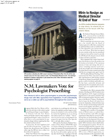Pressure is building from both expected and unexpected sources to revise the Medicare reimbursement formula that produced a 5.4 percent across-the-board reduction in payments to physicians on January 1.
The first challenge came in January, when the Medicare Payment Advisory Committee (MedPAC), an independent federal body established by the Balanced Budget Act of 1997 to advise Congress on Medicare issues, voted to recommend a replacement for the formula.
The existing formula, which resulted in the cut, establishes a target: the sustainable growth rate (SGR). That target is based on four factors: gross domestic product (GDP), enrollment in the traditional Medicare program, input prices, and spending due to new laws or regulations.
Medical associations have long argued that the formula can penalize doctors for factors beyond their control, such as the inability of economists to predict a recession or slowdown in the economy. The current law allows Congress no opportunity to override the formula when establishing payments in any given year.
The new formula would more directly link payment rates to estimates of changes in physician costs, adjusting for gains in productivity. Application of the new formula would result in a 2.5 percent increase in physician reimbursements in 2003.
“The change would be welcome,” Tracy Gordy, M.D., vice chair of APA’s Committee on RBRVS, Codes, and Reimbursements, told Psychiatric News. “It’s much more sensible to link payment to items like costs of liability insurance that affect doctors’ incomes directly than to more global economic changes that have only a tangential impact.”
Edward Gordon, M.D., chair of APA’s Medicare Advisory Committee, pointed out, however, that although the formula should be changed, relief from the cutback is needed now. He added, “Even if there is an increase of 2.5 percent for 2003, we are suffering a cut of 5.4 percent this year, leaving us with an overall reduction for both years.”
Democratic members of the House Ways and Means Committee expressed concerns to Tommy Thompson, secretary of Health and Human Services, at a hearing of the House Ways and Means Committee on February 6 about lack of funding in President Bush’s budget to increase payments to physicians.
After that hearing, Thomas Scully, administrator of the Centers for Medicare and Medicaid Services, said he expected Congress to address the cut during the current legislative session, but added that any increase to clinicians would have to be “budget neutral,” that is, resulting in equivalent cuts elsewhere in the health budget.
Breaking ranks with the Bush administration, House Ways and Means Committee Chair Bill Thomas (R-Calif.) and Rep. Nancy Johnson (R-Conn.) sent a letter to Thompson criticizing his insistence on budget neutrality. According to the February 14 CongressDaily/AM, the two Republicans “take[e] Thompson. . . to task for the budget’s failure to make room for” increased payments to clinicians.
At a hearing on February 14 before the Subcommittee on Health of the House Energy and Commerce Committee, Scully once again reiterated his willingness to work with Congress to “smooth out the yearly adjustments to the fee schedule in a way that is budget neutral across all providers.”
He added, “Improvements in physician payments, or any other Medicare payments, likely will lead to declines in Medicare payments for some other group of providers. There will be tough choices to make.”
Last November, shortly after the cut was announced, APA joined 40 other medical associations to support the Medicare Physician Payment Fairness Act (S 1660) (Psychiatric News, December 7, 2001). The bill would have limited the cut to .9 percent for 2002 and required MedPAC to conduct a study on replacing the SGR as a factor in determining rates.
At that time, the medical associations wrote that the 2002 decrease “would be the fourth broad-scale reduction in physicians’ and other practitioners’ fees since 1992 and would bring the average increase in Medicare fees between 1991 and 2002 down to just 1.1 percent a year, or 13 percent less than the government’s own estimate of practice-cost inflation.”
The bill had 65 cosponsors in the Senate and 316 in the House as of February 14. Neither bill was reported out of committee for a vote.
In an interview in the February 4 American Medical News, Robert Doherty, senior vice president of the American College of Physicians-American Society of Internal Medicine, said that a reversal of the cut would be difficult now because Medicare contractors have begun to pay physician claims. He noted, however, that in the mid-80s, a physician fee freeze was lifted in the middle of the year.
The AMA reports that nearly 30 percent of family physicians are not accepting new Medicare patients. Gordon sees a similar problem with psychiatrists.
“Medicare payment in New York was already one-third to one-half lower than the prevailing rate for psychiatrists,” he said. ▪
